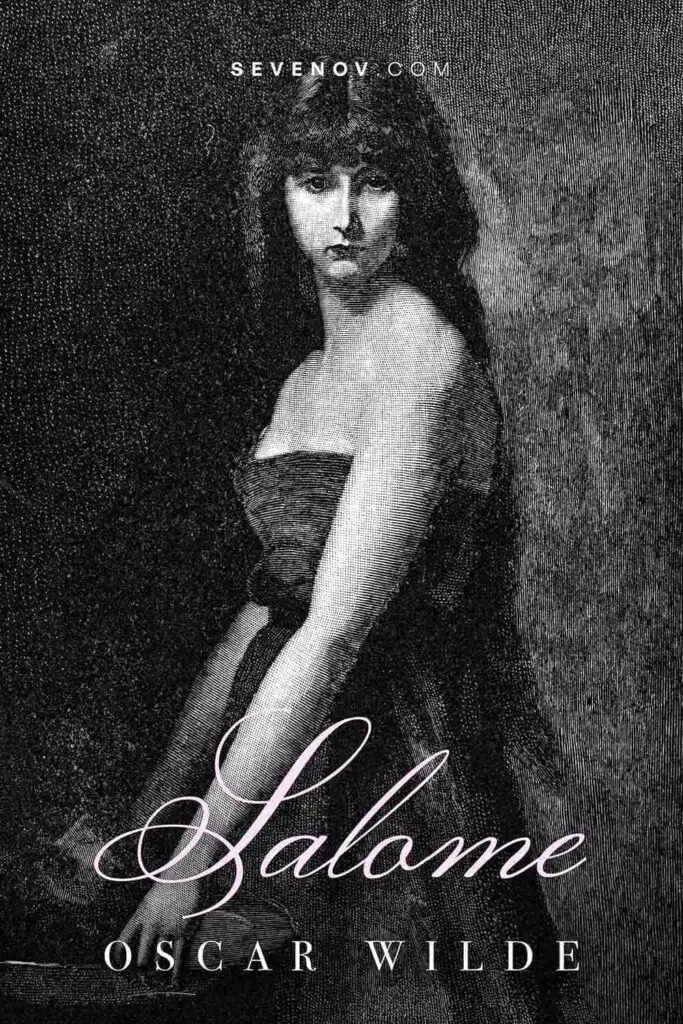
Salome by Oscar Wilde
Author: Oscar Wilde
Published: 1891
Performed: 1896
Genre: Play, Historical, Tragedy
Salome is a one-act play written by Oscar Wilde, originally published in French in 1891. An English translation was released in 1894.
1. Salome Synopsis
Salome is a play that explores the events leading up to the beheading of John the Baptist (Jokanaan) and the twisted desires and obsessions of King Herod, Queen Herodias, and Salomé, Herodias’s daughter. Set against the backdrop of King Herod’s court, the play introduces us to a cast of intriguing characters, each harboring their own secrets and desires. At the heart of the drama is Salome, the beguiling and elusive stepdaughter of King Herod. Her captivating beauty and unpredictable nature draw both fascination and dread from those around her.
2. Salome Summary
The story takes place on a terrace in the Palace of Herod during a moonlit night. Herod, the Tetrarch of Galilee, and his wife Herodias, are hosting a banquet. Soldiers and members of the court are present, and they observe the beauty of Princess Salomé. A young Syrian captain and the page of Herodias discuss the strange behavior of the moon, which appears to be seeking something.
The soldiers discuss the religious disputes among the Jews, and the young Syrian continually admires Salomé’s beauty. Herod is described as having a somber demeanor, and the court is buzzing with activity.
The conversation turns to the imprisoned prophet, Jokanaan, who has been forbidden to speak with anyone, including Herodias. Salomé expresses her desire to see him and engages in a seductive conversation with Jokanaan, who repeatedly rejects her advances. Despite the warnings of those around her, Salomé becomes increasingly infatuated with Jokanaan.
Desperate to kiss Jokanaan, Salomé ignores his curses and ultimately causes the young Syrian to commit suicide. Herod, Herodias, and the court arrive on the scene and discover the lifeless body. Herod is disturbed by the sight of blood and is unsure why the young Syrian would take his own life.
The atmosphere is tense as Herod and Herodias argue, mainly about their marriage and its legitimacy. Herodias was formerly married to Herod’s brother, and there are allegations of incestuous marriage and disputes about their fertility.
During the banquet, there are discussions among Herod, Herodias, and their guests about various topics, including the recent suicide of the young Syrian captain who had been appointed by Herod, the nature of Roman philosophers, and reports of a mysterious man named Jokanaan who is said to perform miracles and prophesize about the coming of a Messiah. Herod is intrigued by these reports and desires to meet this Jokanaan.
As the evening progresses, Herod becomes increasingly fixated on Salomé, Herodias’s daughter, who refuses to dance for him. Herod is enamored with Salomé and makes repeated requests for her to dance. Herodias strongly opposes this, and the tension escalates between her and Herod.
Throughout the story, the voice of Jokanaan, the mysterious prophet, can be heard from a nearby cistern, proclaiming apocalyptic messages and denouncing the sinful actions of those present at the banquet.
Herod expresses his happiness, attributing it to Caesar’s favor and promising to grant Salomé any request she desires, even half of his kingdom, if she dances for him. Salomé agrees to dance but asks for the head of Jokanaan as her reward, a request Herodias and Herod initially try to dissuade her from.
Throughout the play, Herod is tormented by superstitions, ominous signs, and a sense of impending doom. The voice of Jokanaan, who is imprisoned in a cistern, continuously prophesizes doom and chastises Herodias and Herod for their sinful actions.
Salomé performs the Dance of the Seven Veils, and Herod, captivated by her beauty, pleads with her not to request Jokanaan’s head. However, Salomé insists, and Herod reluctantly orders the execution.
After the beheading, Salomé kisses Jokanaan’s severed head, and Herod, repulsed and horrified, orders Salomé’s death.
3. Salome Characters
Salomé – The daughter of Herodias and the central character of the play. She is infatuated with John the Baptist (Jokanaan) and becomes obsessed with obtaining his head as a reward.
Herod – Also known as King Herod Antipas, he is the ruler of Galilee and Perea. Herod is both fascinated and repulsed by Salomé and is torn between his desires and his fears.
Herodias – The wife of Herod and Salomé’s mother. She is depicted as cunning and manipulative, pushing her daughter to demand the head of Jokanaan.
Jokanaan – Commonly referred to as John the Baptist, he is a prophet and a prisoner in Herod’s palace. He is deeply religious and condemns Herodias for her sinful marriage to Herod.
A young Syrian – A young Syrian captain who is infatuated with Salome and ultimately kills himself when she rejects him.
The Page of Herodias – A character who serves Herodias and is present during the events of the play.
First Soldier and Second Soldier – Soldiers in Herod’s palace who carry out orders and maintain order.




